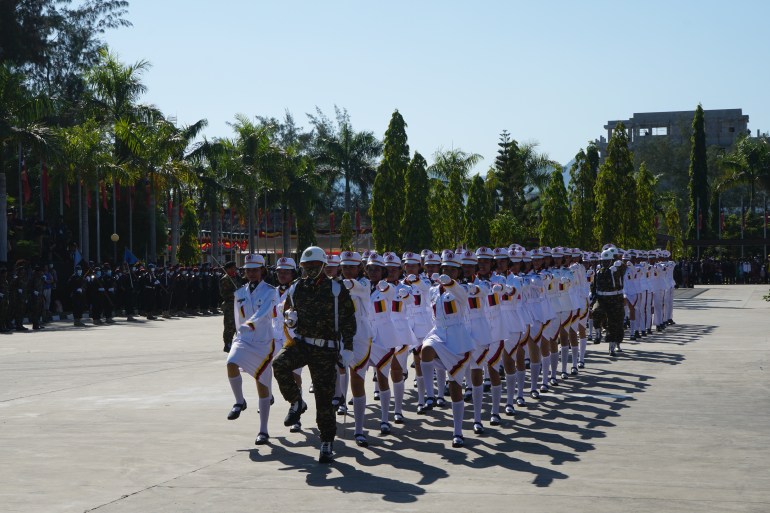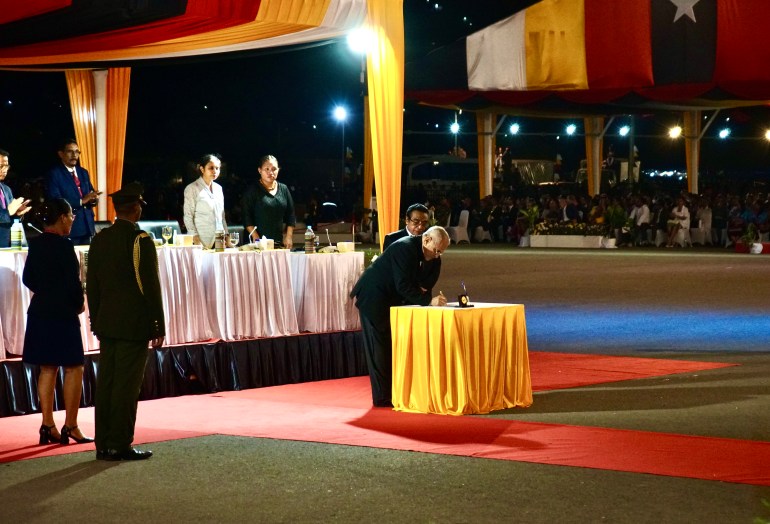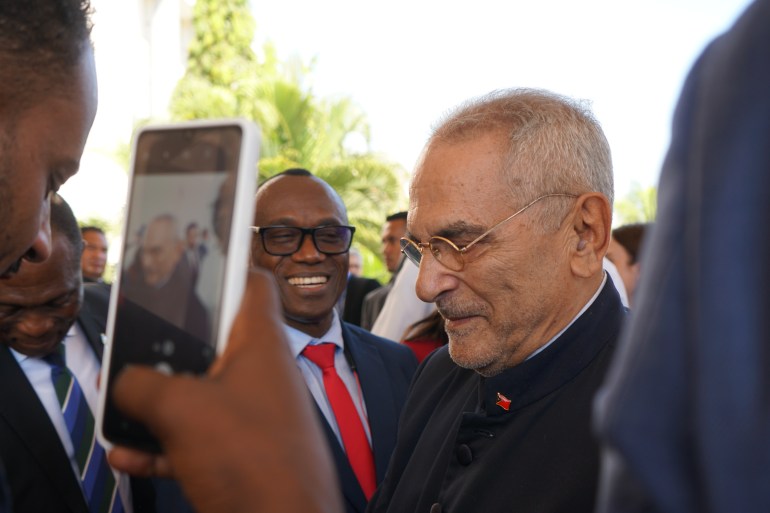East Timor’s president to focus on economy, political stability | Politics News
Dili, East Timor – José Ramos-Horta, who came out of political retirement to run for president of Southeast Asia’s youngest nation a second time, has a raft of challenges as he embarks on his first full week in office.
Ramos-Horta, who has previously served as president and prime minister, decided to re-enter the political arena after accusing his predecessor Francisco Gueterres, popularly known as Lú Olo, of exceeding his constitutional powers and driving the economy into the ground.
He emerged victorious after the presidential vote went to a second round in April.
Known by many as a revolutionary icon, Ramos-Horta was awarded the 1996 Nobel Peace Prize for his work fighting for East Timor’s independence. His global prominence has made him a revered figure within the country – now formally known as Timor-Leste – and abroad, and has allowed him to build an impressive network of friends, many of whom travelled to Dili to watch his inauguration.
Last week, Al Jazeera spoke to Ramos-Horta, who explained why he returned to politics and the kind of leader he hopes to be during his five years in office.
The interview has been edited for length and clarity.
Al Jazeera: Why did you decide to run for president again?
José Ramos-Horta: I was approached in March 2020 by a large group of people who suggested to me that they wanted me to run again for president. Since 2018, current outgoing president [Lu Olo] made many decisions that were viewed as a violation of the constitution by declining to swear in many cabinet members of the then-majority party. He did this two or three times, which in my view and the view of many people, was an abuse of power by overstepping the boundaries of the limits of the president’s authority.

The government was also incapable of injecting life into the economy, especially in the midst of the pandemic. The president entertained himself by imposing lockdown and stay-away measures and that really damaged the economy. Then the government was incapable of compensating people for their work and for their losses.
Al Jazeera: Just a few days before you were to be sworn in, former President Lú Olo introduced a bill to further restrict the president’s powers. Why do you think he pushed for this law just before your inauguration?
Ramos-Horta: No one understands why [this bill was passed]. For one, it is totally unconstitutional. You have a constitution – you cannot have a bunch of political parties in parliament decide the limits of the power of the president. It is so idiotic.
People ask, ‘Well then these laws should also apply to the prime minister, to members of parliament, why only to the president?’ But they cannot because the power sharing is outlined in the constitution. They are so stupid. It’s a very fragile [coalition] government, a bit like if you marry a donkey with a monkey with a chicken.
Al Jazeera: Timor Leste has the lowest gross domestic product [GDP] per capita in Southeast Asia. What is your economic policy?
Ramos-Horta: I understand the limits of the power of the president. I can articulate the wisest policy strategy on how to address economic issues, like strong support for agriculture but that will be in the hands of the parliament to agree and to finance it.
I just hope that I can mobilise enough public support to it and enough support from the international community. I will instead tell the donors, please do not channel any money to the government – the government has access to its budget – all your money that you want to use to help, make sure that it goes directly to the communities, go through a United Nations system.

Al Jazeera: What will be your approach to tackling unemployment, especially among young people?
Ramos-Horta: Number one is we have to improve the education system. We have to focus more on job training and investing more in science and technology and less on humanities. Too many young people go into humanities because it’s easier. So we have to create incentives for students going into science.
I also have no problem with young Timorese people going abroad to work. They make much more money [abroad] than we will ever be able to pay them and they send money home. They learn new skills and they come back changed. It’s a bit like going to university but instead they go to work.
Another way is better education for our people and creating more jobs. We have to create incentives for young people to want to work in agriculture. This is difficult. If we had industrialised agriculture then maybe more young people would want to work but the reality in Timor Leste is we have small land and not much water resources, so I prefer small or midsize agriculture for national consumption. We don’t need to dream about exporting abroad.
Al Jazeera: As a Nobel Peace Prize laureate and longtime politician, you have a large network of international contacts. How could this affect your presidency?
Ramos-Horta: I don’t know whether I have any influence with the international community. I spend time cultivating relationships with people – diplomats, ambassadors, government people, but not with a sense of opportunism. I care about people.
My strength is not because I have numerous titles, those titles came about because of my performance and my commitment over the years. On a human level, I’m the most accessible leader anywhere in the world. If I were to show you my phone, you would see that hundreds of people have my phone number. So many people text me ‘Hello Grandpa’ and of course I cannot say hello or good morning or good night to 1,000 people but if someone calls me asking for help I try to help them with my own money or in some more serious cases I contact my sources in the country.
Al Jazeera: Your inauguration was also the 20th anniversary of Timor Leste’s independence. How has the country changed in the last 20 years?
Ramos-Horta: It has changed for much better. When we started, we had nothing – our annual budget was $63m, now it’s $3bn. Before, we had no electricity, now electricity covers 96.2 percent of the country. We had 20 medical doctors and now we have 1,200 medical doctors.
We have zero political violence and we don’t have any ethnic or religious violence. We don’t have organised crime – I often joke that we don’t have organised crime because generally, we are very disorganised as a country, so even the criminals don’t get organised.

We do have serious corruption but that’s more in the area of contracts whereby things are marked up. For instance, with road construction if it’s done by our government, there are networks of officials and while the bids are supposed to be secret, somehow they know and they pass on the information to their friends, the bidders, so they can outbid the competitors. Ideally we need to have an international and independent auditing to review when a contract is awarded, and review if it was done properly.
Al Jazeera: In your inauguration address you mentioned increasing bilateral relations with China, while also calling on China to lead global dialogue for peace. Some reports now claim that stronger ties with China are a priority for your presidency. What is your response to this?
Ramos-Horta: If you listen to my speech, it’s the only reference that I made that was actually more like an indirect criticism. We are one of the few countries in the world without any debt with China, and China is not even our biggest aid donor. Yes, Chinese companies have won construction projects, such as for road building, but they don’t win everything.
As I said in my [inauguration] speech, the countries that are most important to Timor Leste are Australia, New Zealand, ASEAN countries, Japan and South Korea. These are absolute priorities. Separate from that, China is important, but not more important.

Pingback: สล็อตเว็บตรง
Pingback: try this
Pingback: Aviator
Pingback: pg168